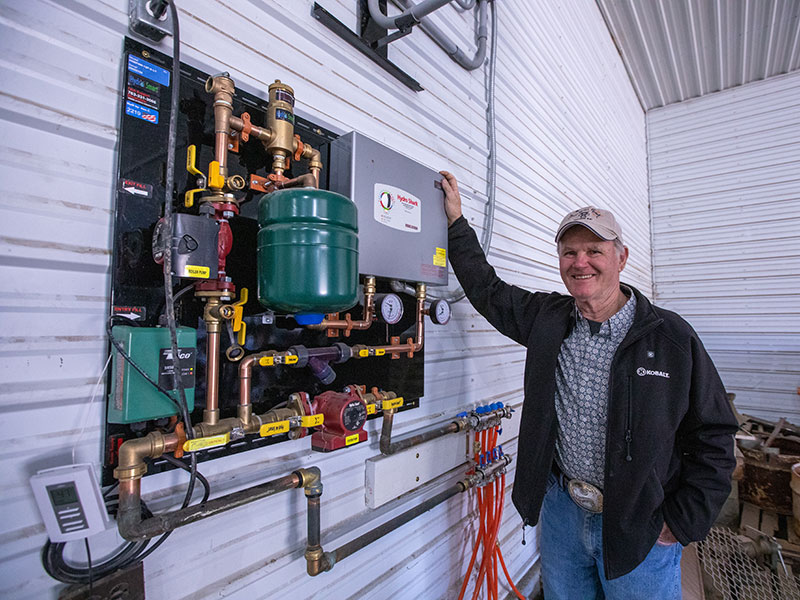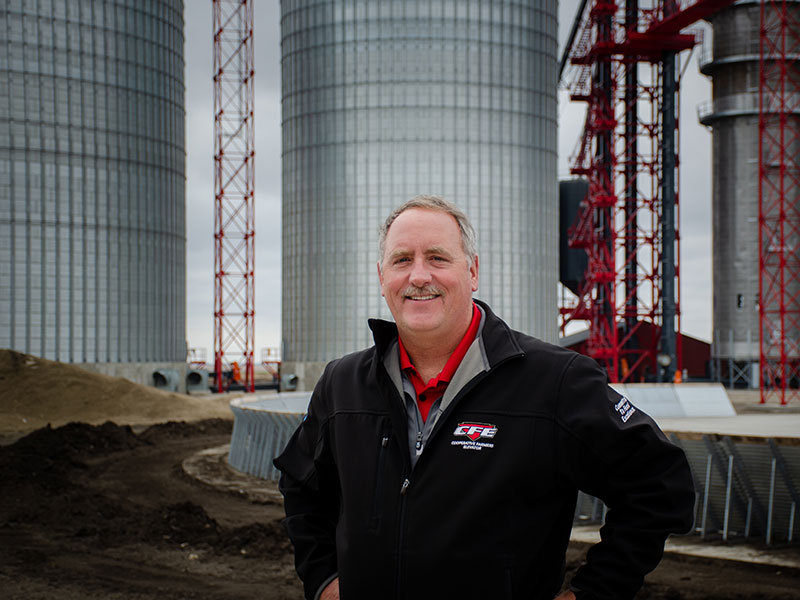Dakota Gasification Company
Headquarters:
1717 East Interstate Avenue | Bismarck, ND 58503-0564 USA
701.223.0441 | 1.800.242.2372
Great Plains Synfuels Plant
420 County Road 26
Beulah, ND 58523-9400 USA
701-873-2100
A subsidiary of:

Cooperatives played a first-hand role in bringing electricity to rural areas across the country. When you look at those small communities, for most, the agriculture industry is at the heart of it.
Even though the same principles the ag industry was built on still live on, the ag producers’ tools and practices have evolved tremendously over the years, largely thanks to the introduction of electricity.
Today, agriculture and energy are more closely entwined than ever before.

Keith Gaaskjolen and his family have been members of Basin Electric Class A member Grand Electric Cooperative in Bison, South Dakota, since it helped bring electricity to the ranch.
“I can remember electricity coming here in ’52 or ’53. We had it before then, but it was just a standby generator in the basement that was gas powered,” Gaaskjolen says. “When the house was built, it was already wired, so the writing was on the wall that electricity was coming some time.”
Gaaskjolen is a second-generation rancher on his family ranch in Meadow, South Dakota. The operation was started by his father in 1947.
He says even though he remembers a time without electricity, it’s hard to imagine working like that anymore.
“Today, I just use a digital scale under a hydraulic chute. If I had to go back to a manual chute and weigh bar, I think I’d quit,” Gaaskjolen says.
“Electricity is definitely part of the evolution of commerce. It’s like a human being, a bunch of systems: cardiovascular, digestive, nervous. Electricity is like one of those systems. I couldn’t say we couldn’t get along without because we did for centuries, but not like we do today,” he says.
Gaaskjolen says not only has electricity brought convenience, but it’s created a safer work environment.
“We use infrared heaters for calves when it’s cold. Years ago, we’d use diesel heaters, but those could put out sparks. Now I flip a switch and we have infrared heat, along with barn cameras to keep an eye on things,” he says.
Gasskjolen says today, people take reliable energy for granted.
“Some of it’s a convenience and some of it’s a necessity, but every aspect of our operation depends on electricity,” he says. “We have standby generators and a few solar wells, so we could get by without for a couple of weeks, but we couldn’t operate like that for very long. Our operation would fold up.”

Eric Watson is a fourth-generation farmer who raises corn, soybeans, and sugar beets. His operation, Watson Partners, has been a member of Renville-Sibley Cooperative Power Association, a Basin Electric Class C member in Danube, Minnesota, since the operation planted its very first row.
Watson says over the years, their need for reliable energy has increased.
“We used to have barely any lighting sources, but as time has gone on, we keep adding more light capacity everywhere we go. We have good lumens everywhere, and have transitioned to LED,” he says.
As farms have become larger and more mechanized, the need for larger electricity motors has increased. Residential homes are usually served by a single-phase power supply, while commercial and industrial facilities often use three-phase power.
“The ability to have three-phase power, like for our dryer site, is vitally important for efficiency and cost savings. Our local REA (rural electric association) added threephase power, and that’s made a big impact,” he says.
“Having more access and reliability for power has been critical,” Watson continues. “If we didn’t have reliable power, it would hit every aspect, from the ability to open a shop door, to pumping fuel, to just turning on our computers. It’s something we take for granted because we’re lucky to have reliable power.”

Cooperative Farmers Elevator (CFE) has a long history dating back to 1899, so like its CEO Rob Jacobs says, “We’ve been around for a minute.”
CFE is a farmer-owned cooperative that services local farms and rural business owners in the agronomy, feed, grain, and lumber industries throughout northwest Iowa, southwest Minnesota, and southeast South Dakota. It has more than 4,000 members and 20 grain locations, including one in George, Iowa.
The George location recently moved to a new site and is now served by Lyon Rural Electric Cooperative, a Basin Electric Class C member in Rock Rapids, Iowa. Jacobs says he appreciated the Lyon Rural Electric team’s insight and willingness to work with CFE while putting together projects.
“We wanted to explore different ways to look at decreasing demand charges. Lyon Rural Electric’s engineers were looking for ways to help us in facility and energy design, and how we put that together,” he says. “They were very customer friendly, willing to work with us, and honest about what they could and couldn’t do. We don’t get that all the time.”
Jacobs says for CFE, electricity touches everything they do.
“If you get to the basics, we’re a processing, merchandising, and transportation company. Whether it’s blending fertilizer or shipping grain to markets or feed mills, everything we do is reliant on dependable and available electricity,” he says. “We have to have enough horsepower and capacity to meet our needs. We ran into that a little bit at one location (that isn’t serviced by the co-op). It wakes you up to say, ‘When there isn’t enough power to meet demands, that’s a big thing.’”
He added that for CFE’s members, who are primarily farmers, reliable energy is just as important.
“From our farmers’ standpoint, there are a lot of livestock facilities we’re servicing. Swine confinements, dairy, cattle-feeding operations – they all rely heavily on dependable energy,” he says.
Approximately 41% of Basin Electric and its members’ residential consumers are involved in farming and ranching. The cooperative is also heavily involved in the commercial side of agriculture.
Basin Electric’s energy sales have remained fairly stable in the last 10 years. Other sectors have grown pretty rapidly, but the cooperative relies on the ag industry to provide a stable base of sales.
Dakota Gasification Company
Headquarters:
1717 East Interstate Avenue | Bismarck, ND 58503-0564 USA
701.223.0441 | 1.800.242.2372
Great Plains Synfuels Plant
420 County Road 26
Beulah, ND 58523-9400 USA
701-873-2100
A subsidiary of:
Basin Electric wants all interested and qualified candidates to apply for employment opportunities. If you are an applicant with a disability who is unable to use our online tools to search and apply for jobs, or who needs other assistance or accommodations, please contact us at 701-223-0441. Please indicate the specifics of the assistance needed or provide your contact information, and a Basin Electric Human Resources representative will contact you. Basin Electric is an Equal Employment Opportunity Employer regarding race, color, religion, sex, sexual orientation, gender identity, national origin, disability, and veterans status.